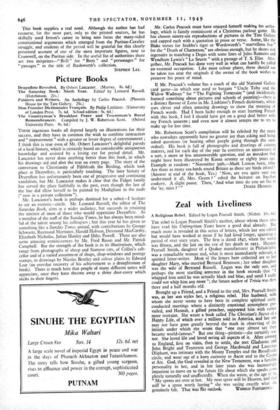Picture Books
Draynflete Revealed. By Osbert Lancaster. (Murray. 8s. 6d.)
THESE ingenious books all depend largely on illustrations for their success, and they have in common the wish to combine instruction and " improvement " with a greater or lesser degree of entertainment ; I think this is true even of Mr. Osbert Lancaster's delightful parody of a local history, which is certainly based on considerable antiquarian knowledge and assisted by a loving eye for period detail. Mr. Lancaster has never done anything better than this book, in which his drawings aid and abet the text on every page. The story of the conversion to Christianity of Filthfroth the Brisling, which took place at Draynflete, is particularly touching. The later history of Draynflete has unfortunately been one of progressive and continuing vandalism, but Mr. Lancaster makes it clear that the Fidget family has served the place faithfully in the past, even though the last of the line did allow herself to be painted by Modigliani in the nude (" now in a private collection ").
Mr. Lancaster's book is perhaps destined for a select—I hesitate to say an esoteric—circle. Mr. Leonard Russell, the editor of The Saturday Book, aims at a wider audience, but succeeds in retaining the interest of most of those who would appreciate Draynflete. As a member of the staff of the Sunday Times, he has always been mind- ful of the talent among his colleagues ; but this year he has given us something like a Sunday Times annual, with contributions by George Schwartz, Raymond Mortimer, Harold Hobson, Desmond MacCarthy, Elizabeth Nicholas, Julian Huxley and Dilys Powell. There are also some amusing reminiscences by Mr. Fred Bason and Mr. Patrick Campbell. But the strength of the book is in its illustrations, which range from photographs of sheep and Siamese cats, of C.ellini's salt- cellar and of a varied assortment of shops, shop-windows and postage stamps, to drawings by Nicolas Bentley and colour plates by Edward Lear (an overdue recovery of his achievement as a draughtsman of birds). There is much here that people of many different tastes will appreciate, once they have thrown away a shiny dust-cover which sticks to their fingers.
Mr. Carlos Peacock must have enjoyed himself making his antho- logy, which is faintly reminiscent of a Christmas parlour game. Be has chosen ninety-six reproductions of pictures in the Tate Gallery and capped each with a quotation in prose or verse. Some, like the Blake verses for Stubbs's tiger or Wordsworth's " marvellous boy " for the " Death of Chatterton," are obvious enough, but he shows real ingenuity in matching a Degas with some lines of Jules Romains and Wyndham Lewis's " La Seurte " with a passage of T. S. Eliot. Alto- gether, Mr. Peacock has done very well in what can hardly be called an essential occupation. Like most colour plates, these should not be taken too near the originals if the owner of the book wishes to preserve his peace of mind.
If Mr. Peacock's volume has a touch of the old National Gallery card game—in which one used to bargain " Uncle Toby and the Widow Wadman " for "The Fighting Temeraire " (and incidentally learned something about pictures and schools of painting)—there is a distinct flavour of Lotto in Mr. Linklater's French dictionary, which uses clever and often amusing drawings to show the meaning of French words. had I been lucky enough to start learning French with this book, I feel I should have got on a good deal better with my French unseen! ; and even now it almost tempts me to try to make up for lost time.
Mr. Robertson Scott's compilation will be relished by the many who nowadays apparently have no greater joy than asking and being asked questions (or hearing other people going through the same ordeal). His book is full of photographs and drawings of country matters, and for each day of the year he contrives an anniversary of a sort, a more or less unanswerable question, and an anecdote that might have been illustrated by Keene seventy or eighty years ago. Example at random: "November 3oth.—Mark Lemon born, 1809. Are there as many sea-birds round Britain as there are birds inland ? (Answer at end of the book, Yes.) ` Now, arc you quite sure you understand it all, Mrs. Green ? ' asked the lecturer on hay-box cookery. A slight pause. Then, ` And what time do you set fire to


































 Previous page
Previous page